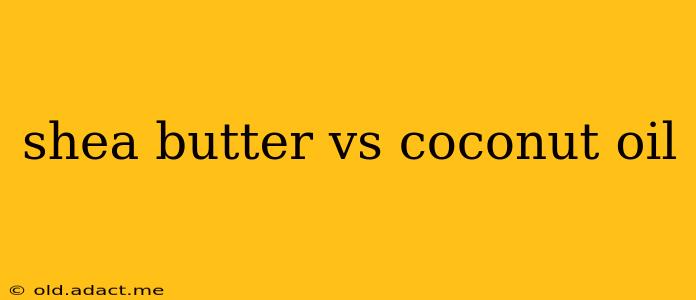Choosing between shea butter and coconut oil can feel overwhelming, especially with the plethora of beauty and health claims surrounding both. Both are natural, widely available, and boast impressive benefits for skin and hair, but their properties differ significantly. This in-depth comparison will help you determine which is the better choice for your specific needs.
What is Shea Butter?
Shea butter is a natural fat extracted from the nut of the African shea tree. It's rich in vitamins A and E, fatty acids, and other beneficial compounds, making it a popular ingredient in skincare and hair care products. Its texture is typically solid at room temperature but melts easily upon contact with skin.
What is Coconut Oil?
Coconut oil is an edible oil extracted from the kernel of mature coconuts. It's composed primarily of saturated fatty acids, particularly lauric acid, and is known for its antimicrobial and moisturizing properties. Unlike shea butter, coconut oil is generally liquid in warmer temperatures and solidifies when cool.
Shea Butter vs. Coconut Oil: A Head-to-Head Comparison
This table summarizes the key differences between shea butter and coconut oil:
| Feature | Shea Butter | Coconut Oil |
|---|---|---|
| Texture | Solid at room temperature, creamy | Solid or liquid depending on temperature |
| Absorption | Slower absorbing, leaves a protective layer | Faster absorbing, can be greasy |
| Scent | Slightly nutty, earthy | Sweet, coconutty |
| Comedogenicity | Low | Medium to High (can clog pores for some) |
| Primary Benefits | Deep moisturizing, anti-inflammatory, wound healing | Moisturizing, antimicrobial, hair conditioning |
Which is Better for Skin?
The "better" choice depends on your skin type and concerns:
-
Dry, mature, or sensitive skin: Shea butter's rich, emollient properties provide intense hydration and a protective barrier, reducing dryness and irritation. Its anti-inflammatory properties can also soothe conditions like eczema.
-
Oily or acne-prone skin: Coconut oil, with its medium to high comedogenicity rating, may clog pores and worsen acne for some individuals. Shea butter, being less comedogenic, is generally a better option. However, individuals with oily skin might find both too heavy.
-
Sun protection: Neither shea butter nor coconut oil provides significant sun protection. Always use a separate sunscreen.
Which is Better for Hair?
Both shea butter and coconut oil can benefit hair, but in different ways:
-
Shea butter for dry, damaged hair: Shea butter's deep conditioning properties help repair damaged hair, reduce breakage, and add shine. It is especially beneficial for natural hair types.
-
Coconut oil for all hair types: Coconut oil's light texture penetrates the hair shaft, moisturizing and adding shine without weighing it down. It can also improve hair elasticity and reduce protein loss.
Is Coconut Oil Good for Your Face?
While coconut oil can moisturize, its potential to clog pores makes it unsuitable for many with acne-prone skin. Those with dry or mature skin may find it beneficial, but always start with a small patch test to check for any adverse reactions.
Can I Use Shea Butter on My Face?
Shea butter's low comedogenicity and moisturizing properties make it a generally good choice for most face types. However, individuals with very oily or acne-prone skin might find it too heavy. A patch test before widespread use is recommended.
Which is Better for Hair Growth?
Neither shea butter nor coconut oil directly stimulates hair growth. However, both improve hair health by moisturizing and strengthening the hair shaft, which indirectly contributes to minimizing breakage and promoting healthier-looking hair growth.
Conclusion
Ultimately, the best choice between shea butter and coconut oil depends on your individual needs and preferences. Consider your skin type, hair type, and potential sensitivities before making a decision. Experimenting with small amounts to see how your skin and hair react is always a good idea. Remember to always perform a patch test before applying any new product to your entire face or body.
